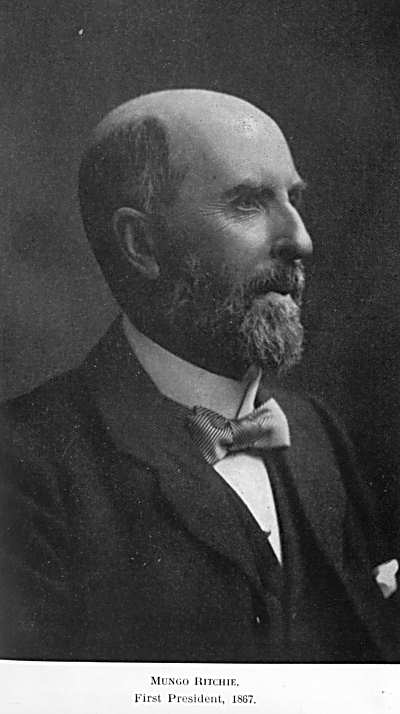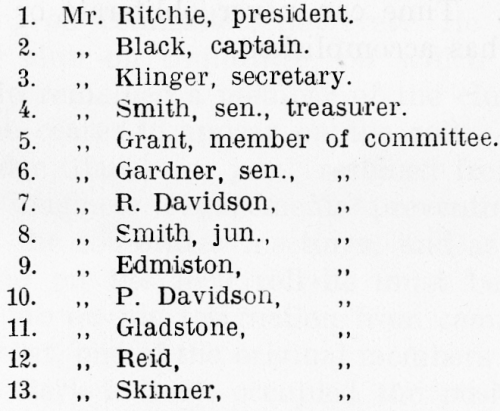Its origin is not exactly lost in antiquity, though after
the lapse of half a century there exist now very few who can bear testimony
regarding the manner of its birth. Three of the original members—two of them
past presidents, and all members of the first committee—who played football
for it, before and after the formation of the club, are yet to the. fore,
and still engaged in business in the city—namely, Messrs. Mungo Ritchie, of
Messrs. Mann, Byars & Co. ; James C. Grant, commission agent, 11 Maxwell
Street; and Robert Davidson, provision merchant, Virginia Street. The first
named was the first president of the club, and Mr. Grant the third, while
Mr. Robert Davidson was elected to committee at the initial meeting. Mr.
Lewis Black was the second president. In sifting the evidence which can be
gathered together at this late date, fifty years after the club was brought
into being, much can yet be gleaned regarding its early history. Football
was played in a more or less liappy-go-lucky fashion in two of the three
great public parks the city possessed in those days, the Queen's Park and
Glasgow Green. Kelvingrove was more of an ornamental park. Play with the
round ball was then comparatively new, and had not been systematised in
Scotland. As no clubs existed, there was no inter-club communication A set
of players met together to amuse themselves, among themselves, in their own
way. A group of young men fixed upon a corner of the Queen's Park Recreation
Ground, opposite the Deaf and Dumb Institution, and there hunted the leather
as it pleased them. No rules, no boundaries, not even goal-posts -piles of
discarded garments indicating the goals and the corners, straight lines
between which indicated the field of play ; no tape, no cross-bar, the
heavens above being the only upward limit, a goal counting no matter how
high the ball passed over the space between the uprights, when afterwards
erected ; failing a goal, a touch down.

One of the old brigade, Mr. James C. Grant, has a vivid
recollection of the origin and early days of the Queen's Park, and his story
may be accepted as correct. He was an active participator in the foundation
of the club, being one of the first committee, and for two years president.
He was also its first goalkeeper, acting in that capacity for five years,
and no goal, not even a touch down, was recorded against his side in any
club match while he was in charge of the citadel. He was succeeded by Mr.
Robert Gardner about 1872, and it was the latter who played in the match
against the Wanderers in London, and also in the International at Partick in
that year. Mr. Grant is a native of Carrbridge. He, with nine or ten others
from the North—Morayshire, Banffshire (Grantown), and Aberdeen—practised
hammer-throwing, putting the ball, tossing the caber, pole vaulting, and
other muscular exercises on a vacant piece of ground near Lome Terrace, on
the Pollokshields side of Strathbungo Bridge. Finding the place cribbed,
cabined, and confined for their more athletic proclivities, and the ground
being required for building purposes, they removed to the Recreation Ground
at Queen's Park, and there took up their location near the pitch which the
football players occupied. A branch of the Y.M.C.A. (Young Men's Christian
Association) had recently been formed on the south side of Glasgow, and a
band of youths connected with the association, under the supervision of a
Mr. Young, pursued the game of football, sometimes so strenuously that they
frequently encroached on neighbouring preserves. The stalwarts from the
North had an occasional kick at the ball in its wayward course, and rather
liked the novelty. The two bodies mixed forces on one occasion only, and had
a game, the Y.M.C.A. being mere youths, which the older men so much enjoyed,
that they decided to add football to their athletic programme, and
afterwards pursued this particular sport to their hearts' content. The
Northerners had no further connection with the Y.M.C.A. The first ball
purchased was the outcome of sixpence per head being collected, and when it
burst another was procured in the same way. No distinguishing marks between
teams were in vogue in the earlier football games— that came later. Teams
were selected on the field. Frequently no more than twenty men were
available, divided into two teams under captains. Then, as their numbers
increased, fifteen and twenty a side constituted the opposing
teams,
and occasionally, if short of men, a spectator or two, friends probably,
were impressed into the fray.So much intelligence and
vigour could not long lie fallow in an undeveloped state, and the idea took
shape of having a regular club of their own. No sooner was this idea
formulated than it took definite shape, with the result that a meeting took
place at No. 3 Eglinton Terrace, Victoria Road, 9th July, 1867, at which the
Queen's Park Football Club had its birth. Mr. Mungo Ritchie, who was elected
the first president of the club in absence, also does not favour a continued
Y.M.C.A. connection. He came in as one of the athletic youths, hailing as he
does from Madderty, in Perthshire. He agrees otherwise with the particulars
furnished so succinctly by Mr. Grant. Mr. Robert Davidson also agrees with
Mr. Grant in every particular. Mr. Ritchie's connection with the club lasted
only one year, as he resigned in July, 1868, on the occasion of his
marriage. Though over eighty years of age, he is still in harness. That
there was an opinion prevailing among later members, of a Y.M.C.A. section
in the club, appears to be beyond dispute, but it simply hangs on the
introducing of the game to the stalwarts who afterwards formed the Queen's
Park club. Mr. A. Rae, honorary secretary, in his report to the annual
meeting in April, 1874, states:—"The muscular Christianity to which we owe
our existence—for we were evolved (that's the scientific term!) from the
Young Men's Christian Association—was not always in favour." That was seven
years after the club had been founded. The Young Men's Christian Association
connection ceased after the one game. That all the meetings of the club were
then held on licensed premises goes far to prove this. The early meetings
took place at White's, 3 Eglinton Terrace, the Victoria Restaurant, the
Queen's Park Inn (M'Arthur's), and the New Restaurant. Afterwards meetings
were held in Buchanan's Temperance Hotel, Carlton Place, and Dewar's
Temperance Hotel, Bridge Street, which last was the headquarters of the club
for many years. It is reported that, while there were few total abstainers
in the club, all were temperate in their habits, and athletic in their
pursuits.
It has been stated that the early minutes of the Queen's
Park club had been lost. No more erroneous statement could have been made.
The minute books of the club are all extant, from the first meeting in 1867
down to the present
day and in perusing them one cannot help being struck
with the exactness with which every important event in connection with the
club is recorded. The various secretaries have been able men, who thoroughly
understood what they were recording, and whose business aptitude is apparent
in every line. The first minute is a historical document of great worth, and
is as follows:—
Glasgow, 9th July, 1867. To-night, at half-past eight
o'clock, a number of gentlemen met at No 3 Eglinton Terrace for the purpose
of forming a " football club." After Mr. Black was called to the chair, a
good deal of debating ensued, and ultimately the following measures were
voted for and carried, viz.:—
First. That the club should be called the "Queen's
Park Football Club."
Second. That there should be four office-bearers,
viz.:—A president, captain, secretary, and treasurer. Third. That
there should be thirteen members of committee, including office-bearers,
seven of whom to form a quorum.
The following gentlemen were then duly elected as
office-bearers and members of committee, viz.:—

The secretary then gave intimation that the committee
would meet on the 15th inst. for further deliberation, and to draw out a
code of rules for the guidance of the club. The business for the evening
being now finished, the members retired, after awarding a hearty vote of
thanks to Mr. Black for his able conduct in the chair.
W. M. KLINGER, Secretary.
LEWIS S. BLACK, Chairman.
Evidently the meeting entertained no superstitious awe
regarding the unlucky number 13—the number of office bearers and committee.
Be that as it may, these were reduced to nine at the first annual meeting of
the club on 4th April, 1868, though for quite a different reason—"the
difficulty in constituting meetings last season on account of the number
necessary to form a quorum being too great. Five in future were to form a
quorum."
A good deal of debating took place over the name to be
given the new club. One section was for calling it "The Northern," another
"Morayshire," and yet a third "The Celts," all of which names would
naturally come from the athletic section, as they savour of a Highland
origin. Mr. Grant, though from Speyside, proposed "Queen's Park" as being
more immediately connected with their existing headquarters. If the club had
a future before it, he said, it should be baptised by the name with which it
was most closely associated. Objection was taken that the word "Park" was
not suitable as a name for a club. "Queen's Park" was ultimately carried,
but only by a majority of one, after a number of divisions. The club has had
a future, the name has become renowned in story, a halo of glory has
descended on its head through the intervening years, and it has been borne
on the summit of the wave to undying renown. Time can never obliterate or
minimise the great work it has accomplished.

